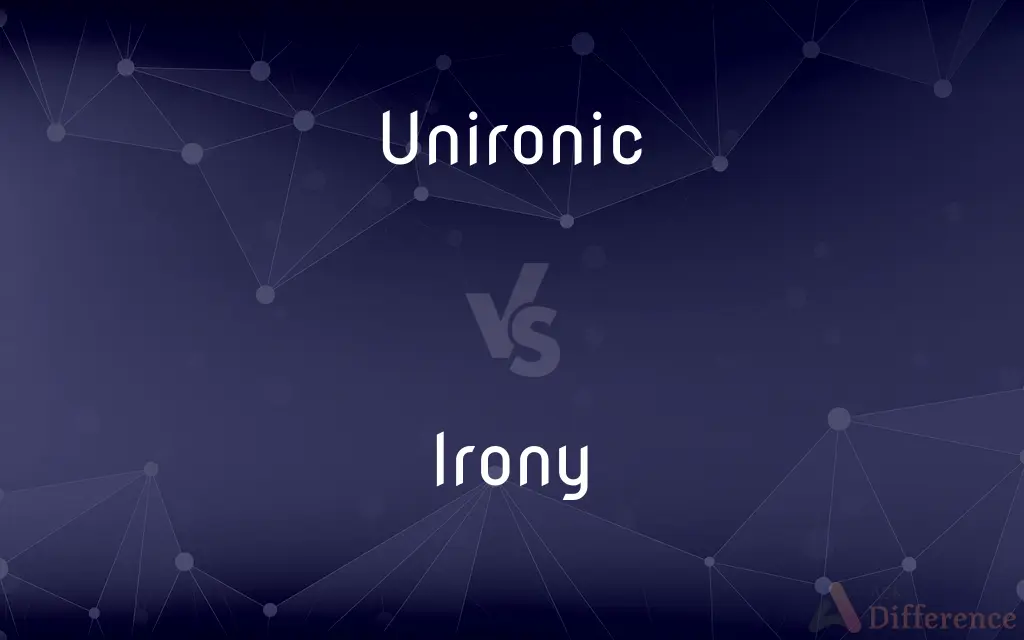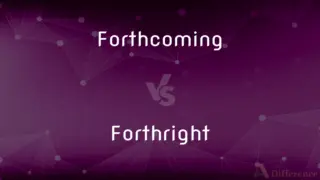Unironic vs. Irony — What's the Difference?
By Urooj Arif & Maham Liaqat — Updated on April 7, 2024
Unironic expressions are sincere and straightforward, whereas irony involves a contrast between expectations and reality.

Difference Between Unironic and Irony
Table of Contents
ADVERTISEMENT
Key Differences
Unironic communication is marked by a lack of pretense or sarcasm, presenting statements or sentiments as genuinely felt or believed. This straightforwardness is key in contexts where clarity and honesty are valued, such as in heartfelt conversations or sincere compliments. Irony, on the other hand, depends on a disparity between what is said and what is meant, or between what happens and what was expected to happen. It's a rhetorical device used for effect, humor, or critique, often requiring a level of insight or cultural awareness to be fully appreciated.
While unironic statements are taken at face value, irony invites the audience to look beyond the surface to find a deeper, often contradictory meaning. Irony can manifest in various forms, such as verbal irony, where the speaker's intention is opposite to the words they use, and situational irony, where the outcome of an action is contrary to what was intended. Unironic communication, however, avoids such complexities, aiming for directness and transparency.
The usage of irony can enrich storytelling, conversation, and humor by adding layers of meaning and fostering engagement through the interplay of expectations and reality. Conversely, unironic expressions can be equally powerful, offering authenticity and emotional resonance that irony might mask or undermine. This sincerity is particularly valued in personal relationships and artistic expressions that aim to connect deeply with the audience.
Deciphering whether a statement or action is ironic or unironic requires understanding the context, the speaker's intent, and often, cultural cues. Irony often thrives in sophisticated or critical discourse, serving as a tool for satire, parody, or social commentary. Unironic expressions, by contrast, thrive in environments that prioritize genuineness and emotional honesty.
Both unironic and ironic modes of expression serve important functions in communication, each suited to different contexts and objectives. While unironicity establishes a foundation of trust and straightforwardness, irony offers a way to navigate complex social and cultural landscapes, critiquing, entertaining, or reflecting on human contradictions.
ADVERTISEMENT
Comparison Chart
Definition
Straightforward and sincere expression
Use of words to convey a meaning opposite to the literal meaning, or a situation that ends differently from what was expected
Key Feature
Sincerity and directness
Contrast between expectation and reality
Purpose
To communicate genuine feelings or facts
To add humor, critique, or layered meaning
Forms
Direct statements, heartfelt expressions
Verbal, situational, dramatic
Contexts Where Used
Personal conversations, sincere compliments
Literature, satire, sophisticated humor
Compare with Definitions
Unironic
Characterized by a straightforward and earnest approach.
The unironic portrayal of characters in the film added to its realism.
Irony
The expression of one's meaning by using language that normally signifies the opposite, typically for humorous or emphatic effect.
It was ironic that the fire station burned down.
Unironic
Expressed or done sincerely and without irony.
Her unironic enthusiasm for the project was contagious.
Irony
A situation that is strange or funny because things happen in a way that seems the opposite of what was expected.
The irony of the situation was that the thief called the police for help.
Unironic
Genuine in expression or sentiment.
The community's unironic support was overwhelming.
Irony
The use of words to express something other than and especially the opposite of the literal meaning.
Saying What a pleasant day during a hurricane is an example of irony.
Unironic
Lacking in sarcasm or hidden meanings.
His unironic compliment took me by surprise.
Irony
A literary technique, originally used in Greek tragedy, by which the full significance of a character's words or actions is clear to the audience or reader although unknown to the character.
The dramatic irony in the play left the audience anxious.
Unironic
Free from cynicism or mockery.
In a world full of sarcasm, her unironic joy was refreshing.
Irony
A state of affairs or an event that seems deliberately contrary to what one expects and is often amusing as a result.
The irony of her reply, How nice! when she found the broken vase, did not go unnoticed.
Unironic
Not ironic; free of irony. Sincere or genuine.
Irony
Irony (from Ancient Greek εἰρωνεία eirōneía 'dissimulation, feigned ignorance'), in its broadest sense, is a rhetorical device, literary technique, or event in which what on the surface appears to be the case or to be expected differs radically from what is actually the case. Irony can be categorized into different types, including verbal irony, dramatic irony, and situational irony.
Irony
The use of words to express something different from and often opposite to their literal meaning.
Irony
An expression or utterance marked by a deliberate contrast between apparent and intended meaning
"the embodiment of the waspish don, from his Oxbridge tweeds to the bone-dry ironies of his speech and prose" (Ron Rosenbaum).
Irony
Incongruity between what might be expected and what actually occurs
"Hyde noted the irony of Ireland's copying the nation she most hated" (Richard Kain).
Irony
An occurrence, result, or circumstance notable for such incongruity
The ironies of fate. See Usage Note at ironic.
Irony
Dramatic irony.
Irony
Socratic irony.
Irony
(rhetoric) The quality of a statement that, when taken in context, may actually mean something different from, or the opposite of, what is written literally; the use of words expressing something other than their literal intention, often in a humorous context.
Irony
(countable) An ironic statement.
Irony
Dramatic irony: a theatrical effect in which the meaning of a situation, or some incongruity in the plot, is understood by the audience, but not by the characters in the play.
Irony
Socratic irony: ignorance feigned for the purpose of confounding or provoking an antagonist.
Irony
(informal){{cite-journal
Irony
Of or pertaining to the metal iron.
The food had an irony taste to it.
Irony
Made or consisting of iron; partaking of iron; iron; as, irony chains; irony particles; - In this sense iron is the more common term.
Irony
Resembling iron in taste, hardness, or other physical property.
Irony
Dissimulation; ignorance feigned for the purpose of confounding or provoking an antagonist.
Irony
A sort of humor, ridicule, or light sarcasm, which adopts a mode of speech the meaning of which is contrary to the literal sense of the words.
Irony
Witty language used to convey insults or scorn;
He used sarcasm to upset his opponent
Irony is wasted on the stupid
Satire is a sort of glass, wherein beholders do generally discover everybody's face but their own
Irony
Incongruity between what might be expected and what actually occurs;
The irony of Ireland's copying the nation she most hated
Irony
A trope that involves incongruity between what is expected and what occurs
Common Curiosities
Can a person be unironically ironic?
While seeming contradictory, someone might sincerely employ irony, being genuine in their use of contrast for effect or humor.
What is an example of situational irony?
Situational irony occurs when the outcome of an event is opposite to what was expected, like a lifeguard station flooding.
What defines an unironic statement?
An unironic statement is sincere, straightforward, and meant to be understood in its direct sense.
What role does irony play in literature?
In literature, irony can create depth, enhance themes, and engage the reader by contrasting appearances with underlying truths.
How does irony add to communication?
Irony adds layers of meaning, humor, or critique, requiring insight to appreciate the contrast between expectations and reality.
How can you tell if someone is being ironic?
Detecting irony often depends on the context, tone of voice, and knowledge of the speaker's intent and cultural cues.
Why do some people dislike irony?
Some might find irony confusing or insincere, preferring the authenticity and directness of unironic communication.
Is irony always humorous?
No, irony can serve various purposes, including critique or highlighting contradictions, and is not always intended to be humorous.
Can irony be misunderstood?
Yes, without adequate context or shared cultural understanding, irony can be easily misunderstood.
Is unironic communication more honest than ironic?
Unironic communication is straightforward and sincere, making it appear more honest, though ironic expressions can also convey deep truths.
Share Your Discovery

Previous Comparison
Forthcoming vs. Forthright
Next Comparison
Isopentane vs. PentaneAuthor Spotlight
Written by
Urooj ArifUrooj is a skilled content writer at Ask Difference, known for her exceptional ability to simplify complex topics into engaging and informative content. With a passion for research and a flair for clear, concise writing, she consistently delivers articles that resonate with our diverse audience.
Co-written by
Maham Liaqat















































